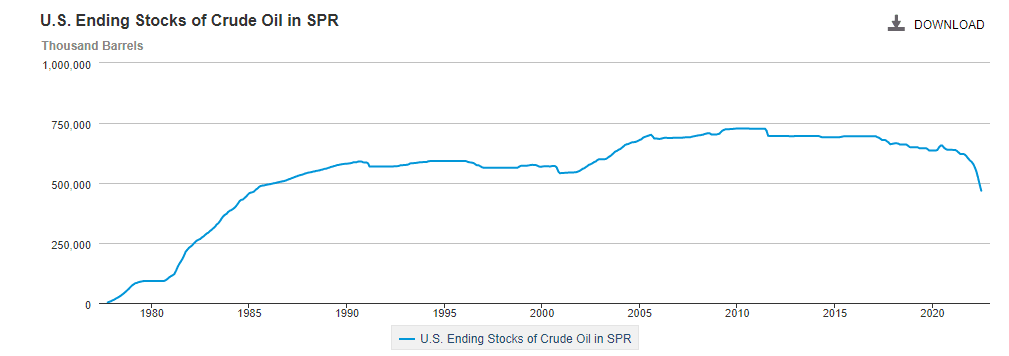President Joe Biden has overseen the biggest drop in the U.S. strategic petroleum reserve since the reserve began in 1977. The supply is now at its lowest point in 38 years.
Since Biden took office, there’s been a 27 percent drop in the strategic petroleum reserve, according to records from the U.S. Energy Information Administration (EIA). Most of the drop in the reserve took place just in the months since the start of the Russian-invasion of Ukraine. In the days after the invasion, Biden banned the U.S. from importing any Russian oil and gas and began drawing more heavily on the strategic petroleum reserve to keep gas prices from spiking.
In February, around the start of the Russian invasion, the U.S. had 588 million barrels of oil the strategic reserve. As of the latest EIA numbers, which are current through July, the oil supply has dropped down to 468 million barrels; a 21 percent drop from the pre-war reserve supply in about five months. Reuters reported on Sept. 12 that the supply had already dropped to 434 million barrels in reserve, an approximately 26 percent drop in the supply since February and the lowest level since 1984.

The Biden administration has continued to pull from the oil reserve, though it remains to be seen where the supply is as of the end of September.
On Sept. 12, hedge fund manager James Lavish tweeted a chart suggesting the U.S. reserve oil supply could be as low as 442 million.
The reserve started in 1977 and reached its historic highpoint of more than 726 million barrels of oil in December of 2009. In the 11 years between that highpoint and when Biden took office in January of 2021, the U.S. reserve oil supply gradually dropped about 12 percent, marking a significantly slower rate of decline than the one seen since Biden took office.
While Biden has been drawing heavily on the reserve supply, he appears to be considering other measures to maintain the U.S. oil and gas supply, including the controversial step of banning U.S. companies from selling their oil abroad. Biden is considering such a move just weeks before the 2022 midterm elections, where public polling has consistently found that high gas prices and the economy in general are the most important issues for voters.
Biden’s critics, including oil industry insiders and Republican lawmakers, have criticized Biden’s decision on his first day in office to cancel Keystone XL pipeline, which would have run from Canada into the U.S. As Biden banned Russian oil and gas imports and U.S. gas prices jumped to historic highs, Biden’s critics said the decision to cancel a pipeline into the U.S. contributed to the pain at the pump.
On Wednesday, the Organization of the Petroleum Exporting Countries and other oil exporters (OPEC+) went forward with a plan to reduce their oil production despite Biden administration efforts to stop them, CNN reported.
In a Wednesday statement, Biden’s National Security Adviser Jake Sullivan and economic adviser Brian Deese condemned the OPEC+ move.
“The President is disappointed by the shortsighted decision by OPEC+ to cut production quotas while the global economy is dealing with the continued negative impact of Putin’s invasion of Ukraine,” Sullivan and Deese said.
Following Sullivan and Deese’s OPEC+ statement, Fox News opinion host Jesse Waters put the blame for gas prices back on Biden’s own economic and energy policies.
“He’s a reckless economic illiterate, and he’s going to cause a lot of pain to the American people because we’re going to need those reserves full at some point, and before then we’re going to have to buy back and restock at about $100 a barrel,” Waters said. “And what do you think that’s going to do to the world price of oil? He doesn’t understand it’s set by the world. He thinks, Fred, that owns the gas station at the corner, sets the price of oil.”
Watters further blamed Biden’s efforts to return to the 2015 Iran nuclear deal for harming relations with major OPEc contributors in the Middle East.
“If you’re not going to unleash American energy, you have to butter up the Saudis,” Watters said. “And so far, he’s cozied up to their biggest enemy, the Iranians.”



